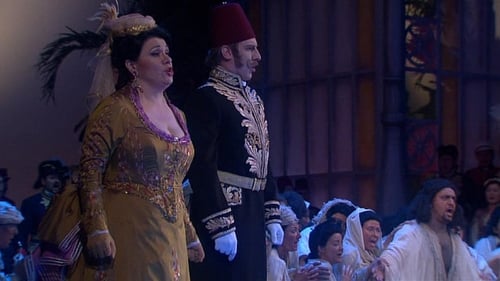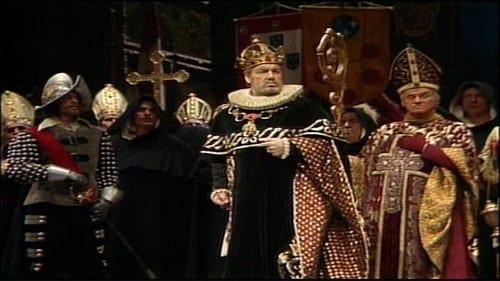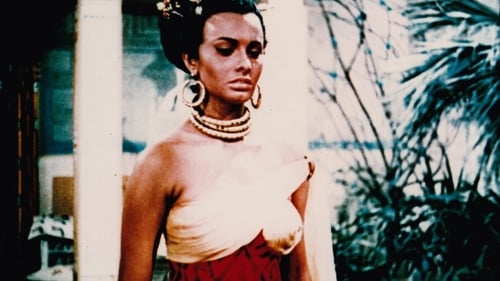
Antonio Ghislanzoni
Nacimiento : 1824-10-25, Lecco, Italy
Muerte : 1893-07-16
Historia
From Wikipedia, the free encyclopedia - https://en.wikipedia.org/wiki/Antonio_Ghislanzoni.
Antonio Ghislanzoni (25 November 1824 – 16 July 1893) was an Italian journalist, poet, and novelist who wrote librettos for Verdi, among other composers, of which the best known are Aida and the revised version of La forza del destino.
Ghislanzoni was born in Lecco, Lombardy, and studied briefly in a seminary, but was expelled for bad conduct in 1841. He then decided to study medicine in Pavia, but abandoned this after a short time to pursue a singing career as a baritone and to cultivate his literary interests.
In 1848, stimulated by the nationalist ideas of Mazzini, Ghislanzoni founded several republican newspapers in Milan but eventually had to take refuge in Switzerland. While travelling to Rome, where he wanted to help defend the nascent republic, Ghislanzoni was arrested by the French and briefly detained in Corsica.
In the mid-1850s, having forsaken the stage, Ghislanzoni became active in journalism in the bohemian circles of Milan, serving as director of Italia musicale and editor of the Gazzetta musicale di Milano. He also founded L'uomo di pietra the magazine Rivista minima, collaborating with, among others, Arrigo Boito.
In 1869, Ghislanzoni retired from journalism and returned to his native Lombardy, where he dedicated himself to literature and writing libretti for operas. He wrote many short stories in verse and diverse novels including Un suicidio a fior d'acqua (1864), Angioli nelle tenebre (1865), La contessa di Karolystria (1883), Abracadabra and Storia dell'avvenire (1884). His novel of theatrical life Gli artisti da teatro, (1865), was republished into the 20th century. He also published musical essays, the most important being Reminiscenze artistiche.
Ghislanzoni wrote some eighty-five libretti, including Edmea for Catalani (1866), Aida (1870), Fosca (1873) and Salvator Rosa (1874) for Gomes, I Lituani for Ponchielli (1874) and the second version of La forza del destino (1869). He also contributed a few verses to the revised translation into Italian of Verdi's Don Carlos.
Ghislanzoni died in Caprino Bergamasco, Bergamo in 1893 at age 69. He was an atheist.

Writer
British director Phelim McDermott offers the audience a new take on the culture of the people of Ancient Egypt in Aida, one that allows us also to question the world in which we live. This new perspective entails a number of bold creative choices that do not make use of the traditional staging imagery associated with Aida. Aida’s command to Radames — “Ritorna vincitor!” — comes at a price. The triumphal march of the victorious Egyptians is a procession for the coffins of the heroes fallen in battle, the chorus are their grieving kinsfolk. McDermott’s staging resonates keenly with the images of so many civilian and military funerals that crowd our newsfeeds. Here is a triumphal march that does not seek to hide the true, lethal and disastrous nature of war, whatever side you are on.

Writer
With its cast of hundreds, thrilling score, and sweeping tale of love and heroics in ancient Egypt, Verdi’s Aida has long been a fixture on the stages of every major opera house in the world. For the 2018 revival of Sonja Frisell’s monumental production of this grand masterpiece, the Met assembled a truly all-star cast. Soprano Anna Netrebko takes on the title role for the first time at the Met, and mezzo-soprano Anita Rachvelishvili plays her rival, the conniving princess Amneris. Tenor Aleksandrs Antonenko is Radamès, the warrior that both women love, and Quinn Kelsey lends his robust baritone to Aida’s father, the fallen king Amonasro. Maestro Nicola Luisotti is on the podium to conduct this epic performance, filmed as part of the Met’s series of Live in HD cinema transmissions.

Opera
Any performance of Giuseppe Verdi’s Aida at La Scala, Milan, is guaranteed to be an experience – but, when it’s a new production, it becomes a major event, especially given the theatre’s notoriously critical audience. Legendary stage director Peter Stein succeeds in delivering a lucid production acclaimed in equal measure by the press and public: “a perfect coup de théâtre” (Giornale della musica). A “stellar cast” (La Stampa) contributes to the production’s success under the musical direction of Verdi specialist Zubin Mehta, who leads the orchestra in a “gorgeously colourful performance”, while “the entire ensemble is brilliant in its portrayal of the characters” (Die Presse).

Writer
Originally commissioned to celebrate the completion of the Suez Canal and the opening of Cairos new opera house, Verdis Egyptian epic Aida is here seen in a spectacular new staging in the Teatro Regio Torino by the Oscar-winning American film director William Friedkin, creator of such famous movies as The Exorcist and The French Connection. The cast features American soprano Kristin Lewis who has been heralded for her remarkable voice, which she uses with powerful dramatic instinct, and Georgian mezzo-soprano Anita Rachvelishvili, whose Amneris dominates the stage with her dark, rounded, irresistible voice and extraordinary stage presence. Gianandrea Noseda leading the Orchestra and Chorus Teatro Regio Torino received accolaides from all: he controls everything- orchestra, singers, chorus, dancers, acrobats- with an all-encompassing overview. He knows exactly when its time to linger over a timbre, a color, an expressive chord.

Writer
"This is Vienna State Opera live at home". March 2015.

Writer
La gran escala y la magnífica acústica de la arena romana en Verona son ideales para el espectáculo de la ópera egipcia de Verdi, presentada aquí en una puesta en escena que es fiel a la producción original de 1913, enmarcada por obeliscos y esfinges y llena de coros y bailarines. La soprano china Hui se ha ganado el reconocimiento internacional por su interpretación de la esclava homónima cuyo amor prohibido por el héroe de guerra Radamés (Marco Berti, el experimentado tenor Verdi) les causa la muerte a ambos.

Writer
Teatro Regio’s 2013 revival of their highly successful 2006 production of Verdi’s Don Carlo celebrates the 40th anniversary of the theatre’s reopening in 1973. With traditional staging and lavish costume design, the production garnered high acclaim in the national and international press, with GB Opera commending the ‘sumptuous’ setting and French online music magazine ResMusica praising director Hugo de Ana’s decision to revive the show ‘in all its splendour’. Shown here in the four-act version, Don Carlo is the fascinating tale of father-son power struggles, adultery and love that borders on incest. The cast – under the powerful baton of Gianandrea Noseda – is headed by renowned Mexican tenor Ramón Vargas, and also features Ludovic Tézier, who has been hailed as ‘one of the best Verdian singers of our time’

Writer
The Met’s spectacular production of Verdi’s Egyptian epic captures both the grandeur and the intimacy of this powerful tale of love and politics. Liudmyla Monastyrska is Aida, the Ethiopian princess-turned-slave in love with the Egyptian warrior Radamès, sung by Roberto Alagna. Olga Borodina is her rival, Amneris, daughter of the Pharao, and George Gagnidze sings Aida’s father, Amonasro, the King of Ethiopia. Principal Conductor Fabio Luisi is on the podium.

Writer
Very nice set and costumes by Mauro Carosi. The procuction is well staged in the relatively small scene at Parma by Joseph Franconi Lee. Here's a performance that really works.Everything seems just right, but if you MUST have the top soloists (Pavarotti, Domingo...), look elsewhere. However, I think that the ones here (Susanna Branchini (Aida), Mariana Pentcheva (Amneris), Walter Fraccaro (Radames), Alberto Gazale (Amonasro), Carlo Malinverno (Il Re di Egitto) do a fantastic job. Also pluses for the ballet and the video production.

Writer

Writer
Aida (2009) Metropolitan Opera. Verdi / Italian. Live from the Met 2009.

Writer
Early recordings of Franco Zeffirelli's 2006 production of Verdi's opera which saw Roberto Alagna's high-profile exit during the second performance. Egypt and Ethiopia are at war. Radames is appointed commander of the Egyptian forces by the King, whose daughter, Amneris, loves Radames. It is in fact Amneris' Ethiopian slave Aida whom Radames loves. Ramades wins the war against the Ethiopians, capturing Aida's father Amonasro in the process. On his return to Egypt he faces a choice between marrying Amneris or betraying his country through his love for Aida.

Writer
The Zurich Opera presents a stunning new production of Verdi’s most popular, most spectacular work. Responding superbly to the role, Swedish soprano Nina Stemme – she of the richly clear voice – offers an Aida vibrant with love and emotion. Heading a magnificent cast, she makes a poignant couple with talented tenor Salvatore Licitra as Radamès. Luciana d’Intino is nothing less than brilliant in the role of Aida’s rival Amneris and Juan Pons imbues his Amonasro with enormous humanity. Conducting the Zurich Opera orchestra and chorus, Adam Fischer brings out all the score’s musical and dramatic majesty.

Writer
tt2266516. Aida (2003) Gran Teatre del Liceu. Verdi / Italian. Filmed at the Gran Teatre del Liceu, Barcelona, Daniela Dessì, Elisabetta Fiorillo, Fabio Armiliato, Juan Pons and Roberto Scandiuzzi lead the cast in the renowned period production filmed in 2003 against the historic paper trompe-l'œil sets painted between 1936-45 by Josep Mestres Cabanes, the last representative of the old Catalan school of scenography. Mestres Cabanes worked on his Aida vision for eight years. The opulent staging he created in 1945 is here in every detail. The seven magnificent sets he painted for Aida in 1945 have been subtly and painstakingly restored by Jordi Castells and his team – revealing the palaces, temples and surroundings of Memphis and Thebes which the set designer had wanted to evoke in his historical yet also fantasy-like vision.

Writer
AIDA, an Ethiopian princess, is captured and brought into slavery in Egypt. A military commander, Radamès, struggles to choose between his love for her and his loyalty to the Pharaoh. To complicate the story further, Radamès is loved by the Pharaoh's daughter Amneris, although he does not return her feelings. Sonja Frisell’s production captures all the grandeur and excitement of Verdi’s monumental opera, particularly the great triumphal scene where the Egyptian army, led by Radamès (Plácido Domingo), returns victorious from war. Aprile Millo is Aida, the slave girl whose love for Radamès has her squaring off with Amneris (Dolora Zajick), the Egyptian princess who also loves him. Sherrill Milnes is Amonasro, and James Levine leads The Metropolitan Opera Orchestra, Chorus, and Ballet.

Writer
La Scala went all out for its 1986 production of this grandest of grand operas, with a strong cast and, most important for a video recording, a larger-than-life staging. The Triumph Scene in Act II is by no means Aida's only attraction, but it is the part that makes the strongest and most lasting impression and it is the visual and musical climax of this production. Stage director Luca Ronconi brings on a procession to dwarf all processions: looted treasures, heroic statuary, miserable captives struggling under the lash of whip-bearing slave drivers. On par with these visuals is Lorin Maazel's first-class performance of the popular Grand March with the outstanding La Scala chorus and orchestra. In Act III, the contrasting tranquility of the Nile Scene also gets a visual treatment to match the music's qualities.

Writer
This was one of the most emotional evenings in Met history—the night Leontyne Price bid farewell to opera. Aida is the role that inspired audiences around the world to acclaim her as the greatest Verdi soprano of her time. And this telecast shows why: the famous soaring phrases that seemed to never end, the shimmering top to her lustrous voice, undimmed by the years. But most of all, there is the ennobling heart and soul Price lavished on every performance—captured here forever. With James Levine conducting the Met orchestra, chorus, and ballet.

Writer
Leonora plans to elope with Don Alvaro, but he accidentally shoots and kills her father, who curses them as he dies. The lovers go on the run, but get separated. Bent on revenge, Leonora's brother Don Carlo, hunts them down.
Verdi painted an immense canvas with this dark but tuneful opera, vividly brought to life in John Dexter’s production, with sets by the great Eugene Berman. The legendary Leontyne Price is seen in one of her greatest roles, Leonora. Price’s soaring voice encompasses every nuance of Leonora’s emotion as she moves from joy through resignation to ultimate heartbreak. James Levine’s brilliant leading of the Met orchestra and chorus is a lesson in Verdi style. Giuseppe Giacomini is Alvaro, the man Leonora loves, and Leo Nucci is Don Carlo, the dark instrument of their Fate.

Writer
Ghiaurov, Freni, and Bumbry were great voices in their time, and they are still effective here -- good enough musicians to put over the quite heavy vocal and expressive demands of their roles. Louis Quilico was never quite in that league, and he sounds a bit spread and woofy in places here, but he works hard and effectively to bring Rodrigo to life. Placido Domingo recorded his first Don Carlo, for EMI with Giulini, about 15 years before this production, but he looks and sounds fine here -- in the early 1980's he was doing very good Otellos and Lohengrins too, and Furlanetto, still in his 30's, brings a rich, young voice to an old part and succeeds in making the Grand Inquisitor vocally as well as expressively formidable. Levine brings both weight and energy to the score, and that reading fits well with the overall "traditional" design and production -- the Met's wardrobe budget must have been severely taxed, but everybody looks splendid.

Writer
tt0255782. Aida (1981) San Francisco. Verdi / Italian. An Egyptian military commander, Radamès, struggles to choose between his love for the enslaved Ethiopian princess Aida, and his loyalty to the Pharaoh. To complicate the story further, the Pharaoh's daughter Amneris is in love with Radamès, although he does not return her feelings.

Writer
tt0262216. Aida (1981) Arena di Verona. Verdi / Italian. Verdi's most famous opera is performed at the Arena of Verona in Italy. Egypt and Ethiopia are at war. Radames is appointed commander of the Egyptian forces by the King, whose daughter, Amneris, loves Radames. It is in fact Amneris' Ethiopian slave Aida whom Radames loves. Ramades wins the war against the Ethiopians, capturing Aida's father Amonasro in the process. On his return to Egypt he faces a choice between marrying Amneris or betraying his country through his love for Aida. This production is conducted by Anton Guadagno and features performances by Maria Chiara, Fiorenza Cossotto and Nicola Martinucci.

Writer
Adaptación cinematográfica de la ópera de Verdi. Voces de Renata Tebaldi para Aida (Sophia Loren), Ebe Stignani para Amneris (Lois Maxwell), Giuseppe Campora para Ramadès (Luciano Della Marra), Gino Bechi para Amonasro (Afro Poli) y Giulio Neri para Ramfis (Antonio Cassinelli).










